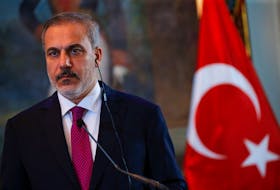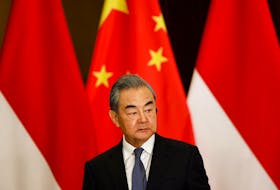It would be foolhardy for the provincial government not to take a serious look into a claim by retired engineer David Fox that the province is owed billions of dollars for the use of its airspace since Confederation, independent MHA Paul Lane says.
“I have no idea whatsoever as to whether there is any validity to what he is saying, but for $9 billion, to sit down with the man for an hour to see what he has to say and look into it is a small investment of time,” Lane said.
“Now that the man has put this forward and it has gone public, I think, at the very least, the government should sit down with him. Then I think the government owes the people an explanation that, yes, we sat down with this gentleman and don’t think there is anything to pursue and this is the reason why, or to say, yes, he made a valid point and we are going to look into it. But you just can’t ignore it.”
In a Telegram story on Wednesday, Fox claimed his research shows that Newfoundland and Labrador has continued to be the sole owner of its airspace since 1949 and that the federal government has collected about $19.7 billion, including interest, from the use of that airspace since Confederation. He said that if half was taken to go toward providing aviation services, then the remaining half — about $9.85 billion — should be returned to the province.
Fox said Term 33 of the 1949 Terms of Union itemized the exact public works and property of Newfoundland that, upon Confederation, would become the property of Canada. Airspace, an important asset to any country, he noted, wasn’t included on that list.
This is not the first time in the 20 years of his research into the issue that Fox has come forward with his claim.
A Feb. 26, 2005 story by then-Telegram reporter Rob Antle referred to briefing notes prepared for then-premier Danny Williams on the issue after Fox had been interviewed about his theory by local media.
The briefing notes suggested the province would not have reaped millions yearly from control of its airspace and, in fact, may have lost money if it had maintained that control.
The briefing notes referred to Term 31 of the Terms of Union, which states that “Canada will take over the following services and … the public costs incurred in respect of each service taken over, namely … civil aviation, including Gander Airport.”
“If NL had retained responsibility for the airspace/navigation above the region, financial benefits accrued would have been limited and would have likely constituted a financial liability over the long term,” the analysis in the briefing notes stated.
In Thursday’s Telegram, Ed Hollett, senior research fellow for the Atlantic Institute for Market Studies (AIMS), said Fox has it wrong in suggesting that airspace was an asset not included in the Terms of Union between Canada and Newfoundland in 1949.
Hollett said that under Term 3 of the Terms of Union, Newfoundland was to become part of Canada in the same way the other provinces did, with the constitution applied, except for changes specifically outlined in the Terms of Union.
There was no reference to airspace or any other territory of Newfoundland and Labrador being treated differently, Hollett said.
“Airspace is part of the territory of the country as a whole, the same way as the territorial sea is under control of the country as whole,” he said.
Historian John Edward Fitzgerald, however, said he disagrees with Hollett’s take on the issue.
“I don’t doubt Ed Hollett’s sincerity, but I think there’s more to it than just simply dismissing it and saying (Fox’s research) proves nothing,” Fitzgerald said.
“What David Fox has done is shown us the value of one of the resources that was brought to Confederation when we joined Canada. A raft of other people, including some of these think tanks, denounced us as the basket case of Confederation. They were saying, ‘Why are we subsidizing Newfoundland?’ Well, the answer to that is that it is a two-way street. We are also subsidizing you. That’s the nature of the Confederation deal, we bring things to Canada, Canada brings things to us. We share.
“And even though it is not written into the Terms of Union per se, I would argue that unless we can find other documentation, then if David Fox’s reading of terms 33 and 35 is there, especially if it is not enumerated in what we keep or what we gave to Canada, then it probably does belong to the province. I’d also like to hear the other shoe drop on this: what do the constitutional lawyers have to say about this?”
Fitzgerald taught at Memorial University for eight years, wrote a master’s thesis on Newfoundland’s Confederation with Canada and spent four years as the province’s representative in the Newfoundland and Labrador Office of Federal-Provincial Relations in Ottawa.
Fitzgerald said Fox has raised a political question that needs to be looked into — whether or not the province still owns its airspace. He said it will take a lot of research to find the true answer.
“(It will take) research at the national archives in Ottawa. It’s research into the seven or eight drafts of the Terms of Union which were created by the delegation from Newfoundland that was sent up in the fall of 1947, and it’s also research into the departmental files of the Government of Canada’s departments of justice, external affairs, transport, and files in the national archives of the Government of Canada’s Privy Council Office. It will be important to see what they were hoping to achieve in negotiations. In other words, what was their bargaining position, what was the intent of the government, and I didn’t see Ed Hollett quoting that. I’m not going to pretend that I can quote that, either.
“I think that once some researcher has a good delve into the negotiations of the Terms of Union and also into the Canadian documents, that will give us the intentions of the Government of Canada and show us what they were hoping to achieve heading into the negotiation of the Terms of Union. We will probably have a clearer picture.”









